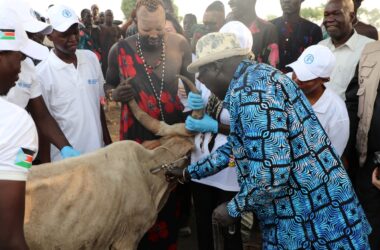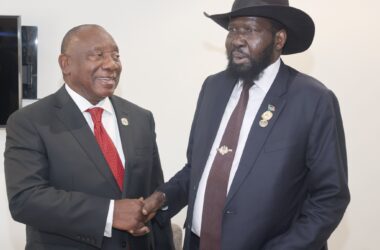By No. 1 Citizen
South Sudan traders, in collaboration with their Ugandan and Congolese counterparts, have submitted a petition to the East African Legislative Assembly (EALA) to address persistent cross-border trade issues.
The petition, delivered to EALA Speaker Rt. Hon. Joseph Ntakirutimana, highlights several obstacles hindering trade among the three countries.
Among the issues raised during the submission of the petition was the dilapidated road network connecting South Sudan, Uganda, and the Democratic Republic of Congo (DRC), which the traders said hampers the smooth flow of goods and services.
They also highlighted high telecommunication costs which they said increase operational costs and hinder effective communication among traders.
They have also raised the issue of border harassment and bureaucratic hurdles at border crossings delaying customs procedures and discouraging cross-border trade.
The traders are urging EALA to intervene and advocate for the removal of these barriers to foster regional economic integration.
Natalia Namaku Jackson, the President of the South Sudan Student Union in Uganda, who was present during the petition, stated that the immigration officials have been harassing even students, especially from South Sudan.
“They always inform us that we are not allowed to bring any food items or juice into Uganda. Whenever we, as students, try to explain that we are returning to our hostel and need to bring these items, they insist that we pay a fee for them,” she explained.
Luttamagzi Semakula, a lawmaker from the Ugandan parliament, stated that he calls upon members present to discuss issues affecting trade between the EAC partner states.
The trade between Partner states in East Africa faces many challenges as they open their markets.
Jackson Atima Buti, a Ugandan lawmaker, stated that there used to be instances of officers under-declaring the value and quantity of consignments, which led to delays in verification. However, these issues have now been addressed and resolved.
“So, the traders from South Sudan and Uganda are not moving smoothly with their goods and we continue to follow and monitor this,” he added.
However, Woda Jeremiah Odok, an EALA member representing South Sudan, stated that some officers often harass traders, causing them to pay more than they are supposed to pay.
“And this will incur extra prices on the consumers,” she stated.
Although, one of the core mandates of the EAC is to create a humble ground for the East Africans, that effort is not visible to many citizens.
“Some countries do not honour our EAC Corporation, so they keep asking citizens to age that give their visa and yet, when you’re operating member, that’s an area that you sig,” said Jacklyn Amongin, an EALA member representing Uganda.
Trade between the East African Community (EAC) partner states is growing, with the value of intra-EAC trade reaching $10.17 billion in September 2022.
The EAC’s trade is primarily based on agricultural commodities, such as coffee, cotton, tea, maize, wheat, rice, and tobacco. However, there is also an increase in the trade of manufactured goods, such as cement, petroleum, textiles, sugar, and steel.




